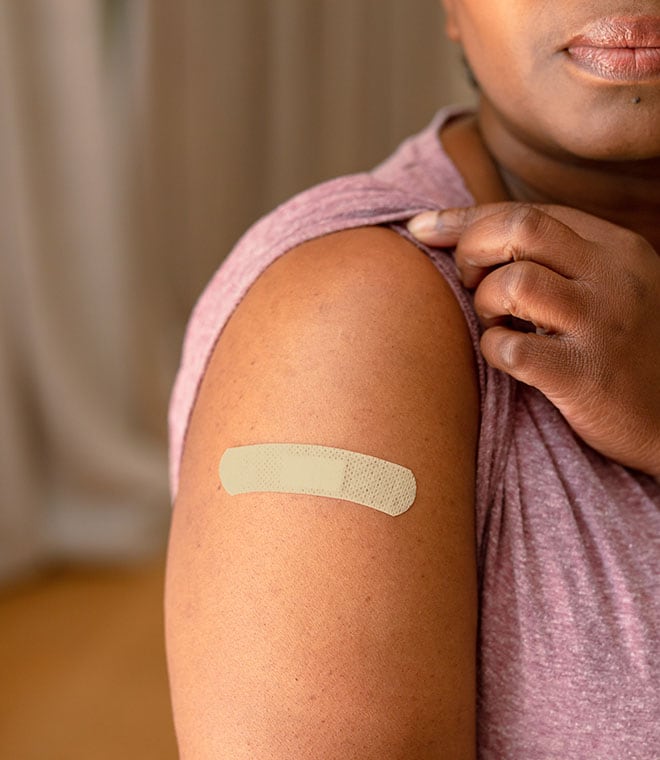Health
Pneumonia vaccine: What you need to know
By Katherine Vu, PharmD Feb 07, 2025 • 5 min
Pneumococcal disease refers to any infection caused by bacteria called Streptococcus pneumoniae, or pneumococcus. The bacteria can cause severe infections of the lungs, blood and lining of the brain. These infections are common in young children, but they’re most life-threatening in older adults. The CDC recommends two types of pneumococcal vaccines that are very effective at preventing serious pneumococcal infections:
- PCV15, PCV20 or PCV21 (pneumococcal conjugate vaccines)
- Pneumovax®23 or PPSV23 (pneumococcal polysaccharide vaccine)
These are sometimes also referred to as pneumonia vaccines. You can schedule an appointment online for a pneumonia vaccine at Walgreens.
What is the difference between the two pneumococcal vaccine types?
There are two differences between the two pneumococcal vaccine types: how many types of bacteria it protects against and how the vaccine is made.
The PCV15, PCV20 and PCV21 vaccines are conjugate vaccines. This means that they contain the sugar part of a bacteria and a protein. The 15, 20 and 21 tell you how many types of pneumococcal bacteria that specific vaccine protects against.
Pneumovax®23 is the brand name for the PPSV23 vaccine. The PPSV23 is a polysaccharide vaccine. A polysaccharide is a sugar molecule that is often found on the surface of bacteria. This vaccine contains only the sugar part of the bacteria. The 23 tells you that it protects against 23 types of pneumococcal bacteria.
Both vaccine types help protect against infection of the blood and lining of the brain.
At what age should I get the pneumococcal vaccines?
PCV15 and PCV20 is recommended for:
- All children ages 6 weeks and older
- People ages 2 and up with certain medical conditions, such as heart disease, diabetes mellitus and kidney, liver, or lung diseases
- Adults ages 50 and older
PCV21 is recommended for:
- Adults ages 19 years and older who currently have a recommendation to receive a dose of PCV have the option to receive PCV21
PPSV®23 is recommended for:
- People ages 2 and older with certain medical conditions
- Adults ages 19 and older who smoke cigarettes
- All adults ages 50 and older
How often do I need to get a pneumonia shot?
How often you should receive a pneumococcal vaccine depends on your age and any medical condition(s) you may have. If you have questions about how many or which pneumonia vaccines you need, talk to your healthcare provider.
What are the side effects of the pneumococcal vaccines?
With all vaccines and medications, there is always a chance for side effects with the pneumococcal vaccines. Most people experience only mild side effects after pneumococcal vaccination. They are generally mild and quickly go away on their own. Mild side effects, such as pain or tenderness at the injection site, fatigue, headache and muscle pain, can happen after getting vaccinated. Talk to your healthcare provider before getting a pneumococcal vaccine if you have ever had a severe allergic reaction to any vaccine.
I just turned 50 and my healthcare provider recommended that I get vaccinated for pneumococcal pneumonia. What schedule should I follow?
For individuals who are immunocompromised, PCV15 or PCV20 should be given first. If PCV15 is given, then PPSV23 may be administered eight weeks later. If PCV20 is given, the pneumococcal series is complete.
For individuals who are not immunocompromised, if PCV15 is given first, PPSV23 should be given a year later. If PCV20 is given, the pneumococcal series is complete.
If a patient receives Prevnar 20 (PCV20) or Capvaxive (PCV21), the patient has completed the pneumococcal series and does not need to receive an additional pneumococcal vaccine, such as Pneumovax®23 (PPSV23).
In any case, PCV15, PCV20, or PCV21 should not be given at the same time as PPSV23.
What happens if I get the pneumonia vaccine twice?
Generally, getting extra doses of a vaccine does not increase your risk of serious side effects. However, with the pneumonia vaccine, you are more likely to have pain or tenderness at the injection site if the doses are given too closely together. In this case, it is the time spacing of the vaccines rather than the number of doses that increases your risk. This is why it’s important to follow the guidelines for getting your pneumonia vaccine. Always talk to your healthcare provider before getting any vaccine.
Updated by Rebeca Thomas RN, BSN, February 2025.
Sources:
- https://www.cdc.gov/pneumococcal/index.html
- https://www.cdc.gov/vaccines/index.html
- https://www.cdc.gov/vaccines/vpd/pneumo/public/index.html
- https://www.cdc.gov/pneumococcal/hcp/vaccine-recommendations/index.html
- https://www.cdc.gov/acip-recs/hcp/vaccine-specific/pneumococcal.html?CDC_AAref_Val=https://www.cdc.gov/vaccines/hcp/acip-recs/vacc-specific/pneumo.html



